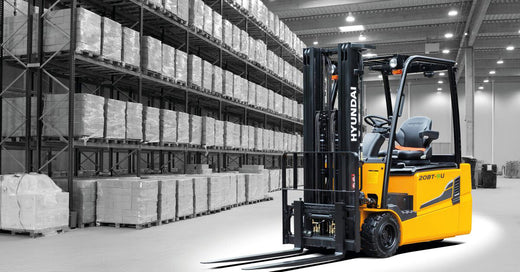
The Forklift Truck Industry: Transforming Logistics and Material Handling with Innovation
Share

Introduction
The forklift truck industry, an essential pillar of contemporary logistics, is experiencing a transformative journey driven by technological innovations. Once seen as simple mechanical machines, forklifts have evolved into sophisticated systems that are redefining material handling and optimizing supply chain operations. As per NMSC analysis, the global forklift market is expected to surpass USD 75 billion by 2030, growing at a remarkable compound annual growth rate (CAGR) of 7.2% during the forecast period by 2030.
This significant growth is not just a result of increased demand for forklifts, but also of the groundbreaking technological advancements that are reshaping the entire industry. Let’s explore how these innovations are enhancing efficiency, safety, and sustainability in forklift operations.
Evolution of Forklift Technology: A Historical Milestone
The story of forklifts dates back to the early 20th century, where the initial models were powered by combustion engines. Since then, the forklift industry has seen a dramatic evolution in design, functionality, and power sources. Today, forklifts run on a wide array of energy sources, including electric, hydrogen, and even hybrid systems. This shift from combustion engines to more sustainable alternatives reflects the industry’s growing focus on reducing its environmental impact and improving operational efficiency.
Electric-Powered Forklifts: A Greener and More Economical Choice
The increasing adoption of electric forklifts is one of the most notable trends in the industry. These vehicles are gaining traction due to their environmentally friendly attributes and cost-saving benefits. Electric-powered forklifts significantly reduce harmful emissions, operate with less noise, and require less maintenance compared to traditional combustion engine models. As businesses continue to prioritize sustainability, the economic advantages of electric forklifts—coupled with their eco-friendly design—are making them an attractive choice for warehouses and manufacturing facilities.
Automated Guided Vehicles (AGVs): Redefining Warehouse Operations
Automation is another game-changing development in the forklift industry. Automated Guided Vehicles (AGVs) are revolutionizing warehouse operations by reducing the need for manual intervention. These autonomous forklifts use advanced navigation systems to move materials with precision and speed, streamlining processes and optimizing warehouse logistics. AGVs not only enhance productivity but also minimize human error and improve overall operational efficiency.
IoT Integration: Forklifts That Think
The Internet of Things (IoT) is enhancing forklift operations by allowing these machines to gather, process, and share valuable data in real time. With the integration of sensors and connected devices, forklifts can now provide predictive maintenance alerts, offering proactive solutions to prevent downtime. Real-time data analytics also optimize productivity by improving inventory tracking, fleet management, and operational workflows. By turning forklifts into "smart assets," IoT integration is making material handling operations more efficient and data-driven.
Artificial Intelligence (AI): Making Forklifts Smarter
AI is another key technology that is transforming forklift operations. By incorporating AI algorithms, forklifts can now use predictive analytics to optimize routes, manage inventory more efficiently, and adapt to real-time fluctuations in demand. These intelligent systems continuously analyze performance data, helping operators make informed decisions that improve productivity and reduce operational costs. AI is empowering forklifts to operate autonomously and intelligently, providing a major boost to efficiency and workflow optimization.
Enhanced Safety Features: Prioritizing Worker Protection
As safety is always a top concern in material handling, modern forklifts are being equipped with advanced safety features such as collision avoidance systems, cameras, and sensors. These technologies provide real-time alerts, helping operators avoid potential accidents and navigate more safely in complex environments. By proactively identifying risks, these features significantly reduce workplace accidents and improve operator confidence, ensuring that safety remains a top priority in forklift operations.
The Future of Forklifts: Emerging Trends and Innovations
The forklift industry is not slowing down. As technology continues to evolve, several trends are shaping the future of material handling operations.
Hydrogen Fuel Cells: A Sustainable Alternative
Hydrogen-powered forklifts are gaining attention for their potential to revolutionize material handling. These vehicles offer a cleaner alternative to traditional fuel-powered forklifts, providing faster refueling times and longer operational hours. Hydrogen fuel cells help reduce the environmental footprint of forklift operations, aligning with the industry’s growing commitment to sustainability.
Augmented Reality (AR) and Virtual Reality (VR) in Training
The future of forklift operator training is also evolving with the integration of AR and VR technologies. These immersive tools allow operators to engage in lifelike simulations of warehouse environments, offering hands-on practice in a risk-free space. AR and VR not only enhance operator skills but also improve safety protocols by providing real-time training scenarios. This technological leap ensures that forklift operators are better prepared for any challenges they may encounter on the job.
Conclusion: A Smarter, Greener, and Safer Future
The forklift truck industry is undergoing a significant transformation, driven by cutting-edge technologies that are reshaping the way material handling and supply chain operations are conducted. With projections for the market to exceed USD 75 billion by 2030, it is clear that these innovations will continue to accelerate growth and reshape the industry.
From electric-powered forklifts and AI-driven systems to IoT connectivity and emerging trends like hydrogen fuel cells and AR/VR applications, the forklift industry is embracing smarter, greener, and more efficient solutions. As businesses increasingly prioritize sustainability, safety, and productivity, these advancements will redefine the future of forklift operations—ushering in an era of transformation that investors should not overlook.
With an evolving technological landscape and an industry on the cusp of major breakthroughs, the forklift truck industry presents a compelling opportunity for investors looking to capitalize on the next wave of innovation in logistics and material handling.